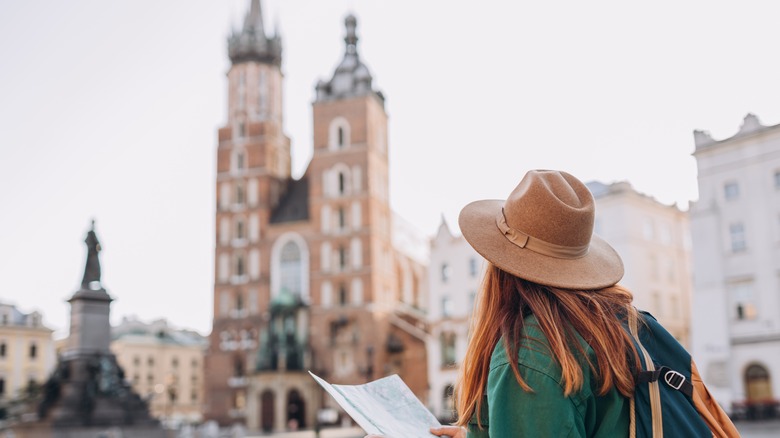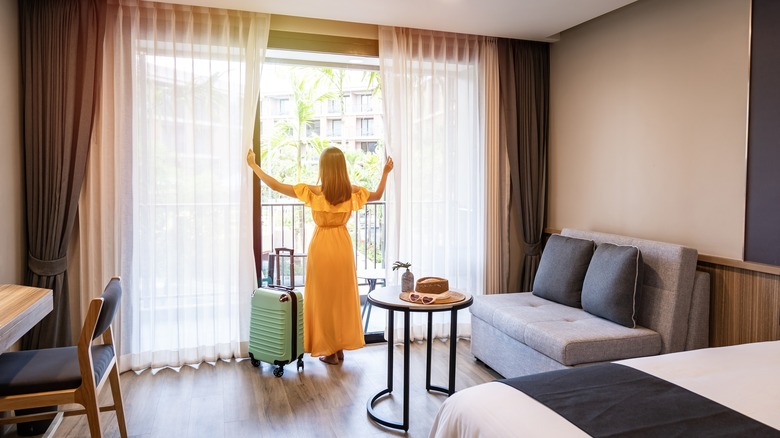Coping With Culture Shock: 9 Tips For Dealing With It Abroad
Culture shock is the phenomenon of feeling out of place or uncomfortable when outside your normal environment. You can experience it in different scenarios, whether that's hanging out with a new group of people, moving to a new city, or visiting a different country. Thus, culture shock is very common when traveling abroad, but often not considered by travelers before stepping onto the plane. It's an important factor to think about, as culture shock can impact your trip in both negative and positive ways, sometimes at the same time.
There are obvious aspects that come to mind when considering a new place — different climates, languages, and food. However, smaller things like different norms for how to act on public transportation or opening hours for shops and restaurants can also surprise you. Lucky for you, we've laid out the most common ways culture shock presents itself, as well as top tips for how to deal with it while abroad.
The different phases of culture shock
It won't necessarily hit you all at once or even immediately. There are actually very well-documented phases that most people go through when experiencing culture shock. The first is called the "honeymoon period" and can begin even before you land. The allure and excitement of a new place can easily paint a rosier picture than reality. You'll be so caught up in how new and stimulating everything is, it's like nothing can go wrong. You'll assume everything is better abroad and even stuff that might normally bother you will come off as charming in this initial stage.
Then, after a while, you may enter the "frustration" stage of culture shock. This is the stage where the fatigue of misunderstanding seems to build up — you become tired of not understanding certain phrases, road signs, hand gestures, and cultural norms. Eventually, though, you will start to adjust and enter the "negotiation period." However, you will eventually enter the "adjustment" stage, where you relax a bit into the differences, and enjoy them — but without the idealization of the honeymoon period. Finally, the last stage is "acceptance," where you adapt to this new place while still holding space for your feelings of missing home. You'll feel more at ease (although still confused sometimes), sometimes irritated, and sometimes in awe of how different everything is. Remember: These phases don't always follow a linear trajectory, you may bounce between all four throughout your trip.
What culture shock looks like
Even if you expect some things to be different, obvious surprises like language can still throw you off. It's one thing to know they speak Spanish in Chile, it's another thing to suddenly hear it exclusively and have to navigate a new country in a language you may or may not understand. Even if you're prepared, have taken language courses prior to travel, or even go to a country where the main language is the same as home, it's never easy. Additionally, you can research the weather, food, and dress prior to departure all you want, but you won't actually know how you'll react on the day-to-day until you arrive. Only once you arrive does reality set in and at first, you may think "oh no, I've made a huge mistake," but don't worry you will adapt eventually. Just try and keep a positive attitude — and embrace the chance to practice new languages and ways of doing things.
The little things can really surprise you when traveling abroad. Whether it's walking on a different side of the sidewalk, eating dinner at a later hour, or even having different small talk expectations — all of it can add to feeling a bit off. And you may not even notice at first, as small things aren't as obvious and may take a while to present. Yet, just like the larger differences, you'll adapt with time. Read on for our tips to help you adapt faster and easier when dealing with culture shock abroad.
1. Research before your trip
The best thing you can do to avoid too many surprises and intense culture shock is to do a bit of research before you take off. Even if it's somewhere you've read a lot about, is often in the news, or featured in the U.S. school system, it's helpful to do a bit of a refresher. It's so easy to find information these days, whether you purchase a few guidebooks, look up your favorite travel blogs, or read an online publication.
Beyond deciding where you'd like to visit in the country, what language (or languages) are spoken, and general facts like climate and food, research provides context. You'll learn more about the history of the country you're visiting, which can help you contextualize aspects of life and the culture on your trip. Doing your research ahead of time will help you have somewhat of an idea of what to expect and will hopefully contribute to less extreme culture shock.
2. Set realistic expectations but have an open mind
After you've done a bit of research, you should be able to have a better idea of what it will be like on the ground. This will allow you to have more practical ideas of what to expect, which will hopefully cushion any extreme culture shock. Instead of idealizing what will happen, you can have a more leveled approach. However, don't be completely narrow-minded, make sure to still keep an open mind.
Research, books, and information online are all great, but nothing replaces time on the ground. Use your pre-trip data collection to prevent too much use of rose-colored lenses, but don't let it go too far to the point that you're almost negative or jaded before you even land. Be open to the place you're going and the new things you'll likely discover. It's about finding a balance between excitement and over-romanticization.
3. Try to learn the language and social norms
One of the best ways to overcome culture shock is to just accept it as a fact and adjust as much as you can. Learning a bit of the local language is a great way to do this, even if it's just a few simple words and phrases. The better you can communicate with those who live in the place you're visiting, the better connected you'll feel and the easier you'll be able to navigate and feel at ease. Additionally, this can help make friends in the community, another aspect that can help overcome discomfort or unsureness in a new place.
Beyond language, learning a bit about social norms (through your research) is also a great way to feel more of a part of the place. This will help you assimilate and not feel like an outsider and make locals more at ease around you, which can help against any hostilities tourists might encounter in certain places. It's also polite to learn and try to practice local, social norms while traveling, regardless of culture shock.
4. Dress appropriately
Throughout your pre-trip research, not only will you learn more about the language, social norms, climate, and history, you'll learn more broadly about the country's culture. This can include how people dress there, which depending on where you've chosen as a vacation, can vary greatly from the U.S. Even if it's somewhere somewhat similar culturally to home, make sure to look up the weather and appropriate clothes for that time of year. You don't want to be the obvious American tourist in Europe with cargo shorts and athletic shoes, which would also be an obvious target for pickpockets. You also wouldn't want to be disrespectful and wear a crop top and short shorts somewhere where the normal dress is much more conservative.
By dressing appropriately you will fit in better and make locals accept you more, maybe even appreciate your presence more, and make yourself feel better. We all want to feel a part of something, even if that just means not being a complete outsider while in a new place. Small efforts like this do go a long way.
5. Get involved with the culture
Of course, as a tourist and visitor, you can't expect to build a whole life in a few days or even weeks in a location. However, the more effort you make to go beyond tourist sites and streets, the deeper connection you'll feel with your host city or country. This can greatly change your view of the place and of the world as a whole, while also making you feel less alienated. Involvement and understanding can help make aspects of life or ways of doing things make more sense and help you adjust a bit better. It will also often lead you to have a more appreciative look on your trip, beyond just a vacation.
There are various ways to go about getting more involved. If you're only somewhere for a short period of time, like a few days, try just going off the main tourist streets and hanging out at more local bars and cafes. If you have a bit more time, perhaps sign up for a class, play sports at a community center, or try and make friends at your hostel!
6. Build relationships with people there
If you make the attempts to be involved with the culture, it sure makes relationship-building a lot easier. Of course, you probably won't meet your new best friend or soul mate in just a few days (although you could), but feeling alone is a huge part of culture shock. Thus, having a few social ties to the place can help remedy feelings of culture shock quickly.
If you're staying somewhere besides a hotel, most hosts are more than happy to have a chat about their home. Even if it's a quick coffee when you arrive and thereafter you just give a quick "hi" each day, having just one social tie can help combat isolation. Beyond that, you can frequent the same cafe and make friends, strike up conversations at the beach, or meet people at various classes or activities you join. You'll come home feeling more connected to the place you went and with a few new stories and maybe even a few additional friends!
7. Maintain relationships back home
This may seem counterintuitive at first, but the sense of isolation you may feel abroad can be helped by staying connected to home. Depending on how long of a trip you're on, this could look different depending on the situation. If it's a week or less, maybe just send a few pictures or messages to friends and loved ones, so you feel like you're sharing the experience. However, on a longer visit, you may want to schedule weekly chats and video calls. The sense of familiarity and home can greatly help any disorientation that comes with being abroad. It can also be nice to talk through anything you're feeling with those that know you best, especially on down days.
However, don't put so much effort into maintaining relationships to the point that those you have or could have abroad suffer. You decided to travel for a reason, and you'd be wrong to miss out on meeting new people and learning more about the country you are visiting. So yes, send pics, and let everyone know you're doing okay, but don't take it to the extreme to where you can't fully take advantage of opportunities afforded by travel.
8. Don't idealize home
This is a big one, especially when you're in the not-so-positive phases of culture shock. It can be so easy to take a negative stance towards the country you're visiting, but try to resist. Especially if it's a very different place from back home, you'll likely feel quite isolated and thrown off at first. You'll probably revert back to the mindset of how everything is so much better and simpler back home. This is understandable and a very common outcome of culture shock, but it can be detrimental to your experience if you don't fight against it.
Remember, you'll only have this particular travel experience once, so embrace it for all that it is, including the good and the not-so-great. After a few days, you'll adjust and realizes the differences are part of the charm of your host country and contributes to the joys of traveling. There's nothing wrong with feeling at home when you're at home, but that's not why you chose to travel. You may just come home and realize you prefer some aspects of life abroad and maybe even make some adjustments in your own day-to-day!
9. Express your thoughts
Your feelings about travel — good, bad, and ugly — are all completely valid. However, you might find them a bit difficult to fully articulate — and that's OK! One of the best ways to work through culture shock is to express everything you're thinking and feeling in the moment. Travel journals have long been staples in suitcases. They're great for recording what happened that day or week and are so fun to look back on years later. Journals are also great for getting out of your head and really writing about how you feel, unfiltered and unjudged. You'll likely come to some realizations you otherwise wouldn't have and better understand yourself in the context of travel and a new culture.
If you're not big on writing, forgot a journal, or are just better with spoken words, try and talk to someone you trust about how you're feeling. If you have a good friend or other trusted confidant, that's a great place to start. Alternatively, if you regularly see a therapist back home, ask if they'd be open to some online sessions while you're away. If not, maybe schedule appointments right before and after your trip to help process everything. Whatever method you choose, validation of your feelings is always helpful.
Remember, culture shock is totally normal
You don't need to feel isolated in your experience, the phenomenon hits millions of people around the world every year. So if you expect, prepare, and deal with it per the recommendations above, there's less of a chance that it will derail the positive aspects of your trip. Even if you only have culture shock for your first initial moments in a country or just the first day or so, traveling, in general, can just make you feel out of sorts. From jet lag to long journeys and water and food that our stomachs need time to adjust to, it's all just part of the travel package. You can also try and build in some time for things that comfort you back home. Whether that's exercise, your favorite Netflix binge, or your afternoon coffee routine, a bit of familiarity can always help.
And remember, cut yourself a break! A trip is a lot to plan and carry through, and it's perfectly fine if every aspect isn't 100% amazing. Often, it's easy to have a certain idea in our head of what will happen and it rarely matches reality, but that's the beauty of travel. Embrace it and you'll really feel the world open up!












